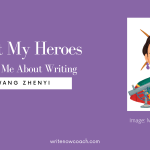NaNoWriMo: The Resilient Writer
When I speak at writing conferences, participants often ask me what matters more: talent or determination. Talent certainly matters, but all the talent in the world will not help the person who gives up after getting rejected. Most of the famous writers I admire have had their share of rejection to overcome in order to succeed. Today, I’d delighted to welcome my colleague Paula Davis-Laack as a guest blogger. I asked Paula to write about one of the key skills writers need to succeed: resilience.
 The Resilient Writer by Paula Davis-Laack
The Resilient Writer by Paula Davis-Laack
The writing process can be a frustrating, elation-filled ball of emotions; as such, writers need to be resilient in order to fulfill their goals. Resilience is the ability to grow and thrive during challenge and change, and it is made up of a number of different skills and abilities. Self-awareness, building confidence, and optimism are a few foundational ingredients in the resilience stew. Whether you are a seasoned writer or writing your first essay, here are several ways that you can build your writing resilience:
Write your thinking blueprint. I have always loved writing, but when I sat down to write my ebook, I couldn’t get the words out and became stuck. Curious about why this was happening, I used the following technique, based on the work of psychologists Drs. Albert Ellis and Aaron Beck, to help develop greater self awareness about counterproductive thinking patterns:
1. Describe factually the activating event or trigger (I tried to write last week and got stuck).
2. Write down your emotions and reactions (frustrated/stopped writing for two weeks).
3. Write down exactly what you were thinking in-the-moment during the challenge (I can’t write a book, the process is just too overwhelming).
4. Ask yourself whether your reaction helped or hurt your ability to find a solution (hurt – I love writing and need to do it consistently; hire someone to help get me back on track).
People tend to focus only on the reaction part of the equation, but those reactions are driven by how you think, and you have control over your thoughts. Use this four-step process when you’re curious about a reaction you had, don’t like a reaction you had, or simply want to find a new way of looking at a problem.
Find fun. Kids have zest in abundance, but as we age, societal and organizational pressures quietly tell us that having fun and being serious don’t go together. Having fun creates positive emotion, which research has shown boosts creativity. If you’re stuck looking at a blank page, take a break and find some fun. Before you know it, the words will flow.
Build self-efficacy. Self-efficacy is your ability to believe you can accomplish what you want to accomplish—it’s confidence. The tendency to remember and dwell on only the times when you’ve failed or done less than your best often thwarts your ability to remember what you’ve accomplished with your writing. To build your “writing” self-efficacy, keep a journal of “wins.” Write down all of the times when you have accomplished something positive or important with your writing. Review this list often and keep adding to it. In addition, don’t be afraid to start small. Small victories create momentum which is a great foundation from which to succeed at more complicated tasks.
While there are many additional skills that will help you build your writing resilience, these three form a solid resilience foundation.
About the Author. Paula Davis-Laack is the founder and CEO of The Marie Elizabeth ® Company (www.marieelizabethcompany.com), which helps high-achieving professionals become more resilient in their daily lives. She is a work/life performance and stress management coach, resilience educator, recovering lawyer, author, and speaker. Paula uses her research-based “Find Your Strong” program to help clients manage stress, perform at their best, and build strong, healthy lives. Paula is one of the first 200 people in the world to have earned a master’s degree in applied Positive Psychology at the University of Pennsylvania. Paula’s “Pressure Proof” blog about resilience, stress management, and work/life performance appears online at Psychology Today (www.psychologytoday.com/blog/pressure-proof), and to date has been read by over 27,000 people. Paula is also part of an elite training team that provides resilience and stress management training to military personnel in the U.S. Army. You can email Paula at paula@marieelizabethcompany.com.














